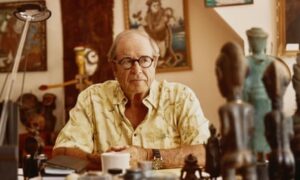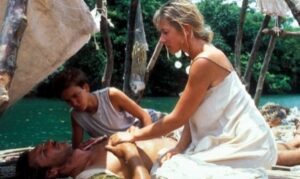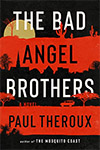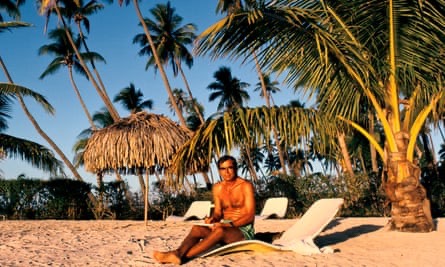Paul Theroux (Malawi): “Writing is a blood sport.”
Thanks for the ‘heads up’ from Dale Gilles (Liberia 1964-67)
Paul Theroux: ‘Writing is a blood sport. One does have differences with people’
by Rachel Cooke
The Guardian
3 October 2022

American novelist Paul Theroux at home in Cape Cod, Massachusetts. Photograph: Simon Simard/The Observer
The prolific novelist and travel writer is 81 but shows no signs of slowing down. He talks about adventure, criticism . . . and that memoir by his ex-wife.
In an ideal world — by which I mean one that lives up to my most energetic fantasies – Paul Theroux and I would be meeting in some far flung and exotic place: on an empty platform in a distant railway station, or under a date palm in a dried-up desert oasis. Both of us would have dust on our boots. One of us would be wearing a bad hat, or even a good one. Our conversation, which would unfold like an old map, would come with a soundtrack comprising the cries of market traders, the whistle of a train and the bellow of a camel.
Alas, the world is not ideal. Neither one of us is going anywhere today. Theroux and I talk via video call, his summer-tawny face at first a little blurry on the screen of my laptop. He lives, for most of the year, in Hawaii. But he spends the summer at his house on Cape Cod, which is where he is today: in an attic, from the look of things. And I suppose this is appropriate, really, albeit a bit (for me) disappointing. While he has always made much of his escape from his Massachusetts roots, a process that famously began when, after university, he joined the Peace Corps and went to live in Malawi, he continues to be bound to this part of the world as if by invisible rope. Not only is his extended family still here, or some of it; New England is also the setting for his extraordinary new novel, The Bad Angel Brothers, a manic tale of sibling rivalry that owes its small town setting mostly to John Cheever, and its seething resentment mostly to William Shakespeare.
Theroux is 81 now, but you’d never know it. He seems barely to have changed physically, and by all accounts the man who made his name first as a travel writer is still madly vigorous. When he celebrated his big birthday last year, he wrote in the New Yorker of paddling his outrigger canoe offshore, and now he informs me that when Canadian truckers mounted their blockade of Ottawa in February – a protest against a mandate requiring them to be vaccinated against Covid-19 – he drove from Cape Cod through deep snow to take a look at what was going on.
“A policeman was going to arrest me,” he says, proudly. “But I told him: I’m not loitering, I’m witnessing history. I’m stoic, you know. The snow was blowing across the road, but I have a four-wheel drive car, and I love to make road trips.” His last book but one, On the Plain of Snakes, was an account of his travels in Mexico by car, a journey inspired by Donald Trump’s disparagement of the country, and it seems that he isn’t done yet so far as adventure goes: “I’d like to go back to Malawi, and to Congo, the Philippines, India, Guatemala, Papua New Guinea, and to be a teacher for, say, two or three weeks in each place. In every country, I would teach the same story to my students, and I would ask them: what are your worries, and what are your dreams?” Is he serious? “Yes. I would love to go back, and I intend to go back.”
His new novel is like nothing else I’ve read: at once maundering and intensely emotionally violent. But you can also draw a fairly straight line between it and some of the books that preceded it (at least 56). Theroux has always been good at enraged men (see The Mosquito Coast –1981), and family angst is a speciality, too (see Mother Land, – 2017) among other novels). As for fraternal love gone wrong, who could forget his memoir Sir Vidia’s Shadow – 2001) in which he describes, ruthlessly and with utmost brilliance, how he fell out of love with his (megalomaniacal, racist, sexist) friend and mentor, VS Naipaul? Fights are, you might say, a theme, in his personal realm as well as his writerly one. Readers with long memories may recall that, in 1996, Alexander Theroux, also a writer, unaccountably reviewed his brother’s patchwork memoir, My Other Life – 1997) delivering an acidulous little bit of criticism in which he described Paul as a snob, a know-it-all, and a star-fucker.

Harrison Ford, River Phoenix and Helen Mirren in the 1986 film version of The Mosquito Coast. Photograph: Warner/Allstar
I want to ask if The Bad Angel Brothers is based on any relationship in particular – does Alexander haunt its pages? – but this is awkward; such a question might suggest I’m also wondering whether Theroux has murderous impulses. So I mutter instead something feeble about how visceral his narrative is. But of course he knows what I’m up to, and while he happily agrees that his own large family is complex (he’s the third of seven children), the more horrible of the two Belanger brothers, Frank, a boastful lawyer, really is no one in disguise – or so he insists. He saw Alex only yesterday; they’re friends, and have long been so.
What has bound us together is reading and writing – reading, especially. Writing is a blood sport [in our family], so you do battle, and it’s hard feelings at the time. But Alex has read this novel, and he thinks it’s my best book. We’ve had our differences. One does have differences with people. Naipaul’s a perfect example of that. But a second act is possible.
He and Naipaul were reunited in the years before he died.
After 2011, I reconnected with him, though this was against all his principles. He always said, if a person lets you down, you’re done. Don’t give them a second chance.
Their relationship was, he says, both familial and non-familial.
He wasn’t my brother. But I understood his relationship to his brother [the novelist Shiva Naipaul, who died too young] because I have four brothers of my own, and he also understood mine to them.
The Bad Angel Brothers was written during the lockdown, an experience its author enjoyed (no pesky tourists in Hawaii), and also during a period in which the US endured a certain amount of political trauma. Can it, then, be read metaphorically, the war between the brothers a stand-in for the US’s painful internal divisions? “That’s an interesting reading,” says Theroux.
And there is a grain of truth in it. I would say we are a fractured country. But I also lived through the 1950s and 1960s. The ’50s was a time of racial strife that culminated in 1963 with the civil rights movement. Violent cities burned with more violence. The police were shooting, and people were dying, and once you’ve been through that, you realise: I’ve been here before. We’ve had racist presidents before. Truman was always using the N-word; Johnson was a good old boy from Texas. And then there was Vietnam. One of the reasons I joined the Peace Corps and went to Africa was because America was unbearable. It was on fire.
He thinks people should keep things in perspective.
He wouldn’t, he says, want to be a young writer now. The censoriousness that is all around reminds him of when he was starting out: a time when books by Henry Miller and DH Lawrence were still banned. A few years ago, he gave a talk at the University of Michigan. At lunch afterwards, he was asked which novels inspired him.
I said that one of my favorites, which I’ve read a dozen times, is Heart of Darkness by Joseph Conrad, at which point a Nigerian student said: I hate that book. I looked around at his teachers, but they would only agree with him. Oh, there are a lot of problems with Conrad, they said. They were pandering to his sensitivity because they were frightened. It was ridiculous. The book is a masterpiece. Conrad was a visionary. But I didn’t blame the student. We should give students credit; they’re not the ones who talk about being triggered. No, I blamed his teachers for trying to protect him.
Theroux decided to eat his pudding elsewhere, and promptly left. “This is a book-burning period,” he says.
But I also think it’s a time for writers to resist self-censorship. A great writer might emerge from it, even if they have to self-publish. I became a writer because writers were outlaws [in the ’60s]. They were free men. They were dangerous people.
His life now, though, is hardly that of a renegade. It is magnificently replete: cosy, to a degree. He and his second wife live in a beautiful house – I’ve seen it on TV – that stands on stilts. There are beehives and geese. Writing comes easily to him, and he can’t see any reason to stop.
It’s joy, pure joy. The pleasure of blackening the page, of creating something, imagining it. My heroes are prolific writers: Georges Simenon, Patrick White, Ford Madox Ford.
His books may no longer be the wild bestsellers they once were – his first big hit was The Great Railway Bazaar, in 1975, which sold in its millions – but he has enjoyed a new flourish recently, courtesy of the TV series of The Mosquito Coast, starring his nephew, Justin Theroux. The novel came out in 1981 (and was later made into a movie starring Harrison Ford), but it has a new resonance now. Theroux’s story of a man desperate to live off-grid was prescient; America is fuller than ever with guys who regard the federal government with suspicion, who believe that the end (whatever that might involve) may be nigh.
Yeah, that book was written in Wandsworth,” he says, with a disbelieving laugh. “But I’d like to think that what you say about prescience is true. Naipaul made a great observation, which is that the present, accurately seized, foretells the future.
It’s hard to imagine him in Wandsworth. But he was once no stranger to the south London suburbs. His first wife, Anne, was English. He met her in Africa (they married in Kampala in 1967). After living in Singapore for a while, they returned to London to bring up their sons: Louis, whose documentaries have made him famous, and Marcel, a novelist and film-maker. Both men and their families – his grandchildren – visited him in the summer, and it’s very sweet to hear him talk about this. “Oh, man, it was heaven,” he says. “First, I admire them [Louis and Marcel]. They were so studious: Oxford, Cambridge. And now I see them in an expanded way. There they are on screen. Wonderful.” He lists their recent achievements, and then he says: “So, they visited, and there were 11 of us around the table, and they’re so funny, and they’re readers, and they have such a work ethic.” A pause. “They probably got something from me, which is that I never had a proper job.”
I don’t wish to drop a fly in this lovely ointment. But I’m afraid that I must. Last year, Anne Theroux did something she had, or so it seems, wanted to for a while: she published her first book, a memoir about the end of her marriage, and the terrible pain this caused her (after infidelities on both sides, the couple finally separated in 1990, and he went off with his now wife, Sheila). This volume wasn’t – I reviewed it – any kind of masterpiece. But still, it successfully captured the highly particular agony that comes of being loved, and then not loved, by a certain kind of man. Her descriptions of her ex-husband came with a hard-won clarity — his confounding combination of fire and ice; his tendency to say to her what he does not quite mean — even if her decision to publish so long after the events she describes is quite hard to understand.
Theroux is hardly in a position to complain; scenes from their marriage certainly made it into his writing. But still, I’m curious: did he read her book? And if he did, what was it like, finding himself a character in someone else’s story at last? Uh oh. I sense that the flood gates are about to open, and sure enough, they do. He tells me that he first read some kind of manuscript in 1992.
I made suggestions, and one of them was: this is not a book, this is just a rather patchy diary. It has no depth. It’s very thin. You need more detail. You need more emotion. You need somehow to make it a book. A book is a very difficult thing. A diary is a piece of cake. Anyone can keep a diary. So when it came out, I didn’t brace myself. I read it, and I annotated it.
(Apparently, he turned down an offer to review it.)
And did he feel the final version was fair? Did he recognise himself? Now he goes into great detail, listing all its contradictions, all the things he believes are untrue. In an effort to rebut Anne’s accusation that he was a workaholic, he tots up the hours she was working at the time, a very precise calculation that involves her commute to London from Dorset, where they were then living. He also tells me that when she was interviewed (in this newspaper), he made the mistake of looking at reader comments. “They were mainly against me. I’m a narcissist. You’re better without him. That kind of thing.” He shakes his head, ruefully. “I mean… talk to my wife. I’ve been married to her for longer than I was married to Anne, and we’re still deeply in love.”
Anne had everything she wanted, he goes on. “She had it all. We had children. We had money. She had a job. She retired with a pension.” The question hangs in the air between us, unspoken. What did she hope to gain from publishing her book? What did she want? Oh dear. The only answer I can give him — and I do, though he doesn’t much like it — is that, once upon a time, there was one thing that she longed for desperately, and that was him. On some level, she has never gotten over him — and perhaps the same is true for him, too. How else to account for all that he has just said?
Perhaps you’re thinking, after hearing this part of our conversation, how thin-skinned Theroux sounds, and how unnecessarily critical, stubbornly replaying old arguments. In person, though, his words have a very different effect on me. He seems very human, suddenly. To the end of our days, there are things we can never quite understand — hurts that will not go away; mistakes we’ll always regret — and he’s no exception, this man whose name was spoken with such admiration in the house where I grew up. Earlier, when he was talking about leaving America as a young man, he quoted Jung at me: “Discover the self, he said. But it’s not a linear thing, is it? You don’t say: ‘I’m going to go there, and discover myself.’ It’s a circumambulation.”
In the sudden silence after our call ends – he is excellent company, even by laptop – all I can think is that even the greatest travellers end up right back where they started in the end.


Thank you for this timely article. It is a perfect connection to Marian Haley Beil’s mention of Theroux on her virtual event. The author perfectly captured his complex character. Personally I love his intention to continue his travels at 81. It gives me hope. I would love to know what story he would teach for 2-3 weeks in each place.